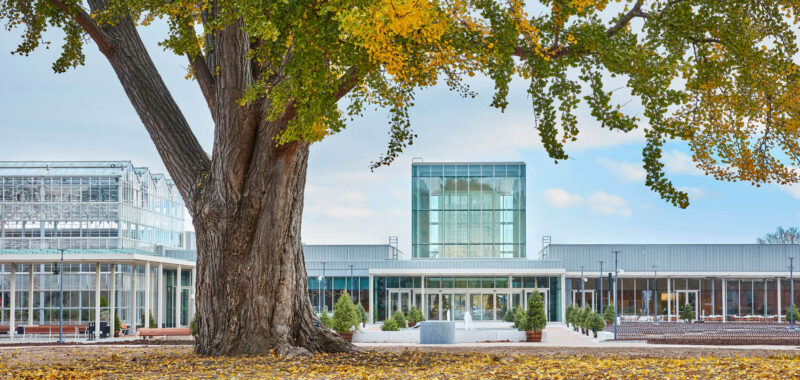St. Louis, Missouri, is home to the country’s oldest botanical garden, founded in 1859. At Missouri Botanical Garden, Ayers Saint Gross recently completed a handsome new visitors center, adding a fresh face to the historic property. Michael Vergason Landscape Architects ideated the new center’s arrival sequence with Ayers Saint Gross, as well as two new gardens to its rear.
Today, Missouri Botanical Garden is considered a world leader in plant life research. It has more than 1 million annual visitors. The new Jack C. Taylor Visitor Center will do much to help those patrons orient themselves upon arrival. The 94,000-square-foot, LEED Gold Building has an event center, flexible auditorium, classroom space, a guest shop, and cafe.
A winding path lined with shrubbery leads guests to the central atrium, the new visitor center’s signature space. This portion rises up from the wing, washing the main area with natural light. Daylighting is diffused by metal screens designed to mimic tree canopies. Leaf patterns are scattered on the ground floor with furniture made of tree trunks, and other natural elements.

Architecturally, the new visitor center’s facades are a dynamic interplay between transparency and opacity. Its north facade is solid, and its south facade is porous, mimicking traditional greenhouse design. This porosity washes the generous atrium space with light as visitors pass through into the gardens.
Other natural elements were woven throughout the project as seen in the custom terrazzo flooring, in the Missouri woodland-inspired brass accents, desks influenced by rocks and pebbles, and pendant lights that evoke “fireflies, stars, and droplets of rain.”

After passing through the sun-filled visitors center, guests can enjoy the new North Garden and World Woodland Garden by Michael Vergason Landscape Architects. There, the gardens host more than 46,000 plants representing 300 species, many of which are endangered.
The mission driving the new addition and gardens, Ayers Saint Gross added, was “to discover and share knowledge about plants and their environment in order to preserve and enrich life.”

Looking ahead, the new gardens will welcome seasonal events, weddings, and educational programming.

